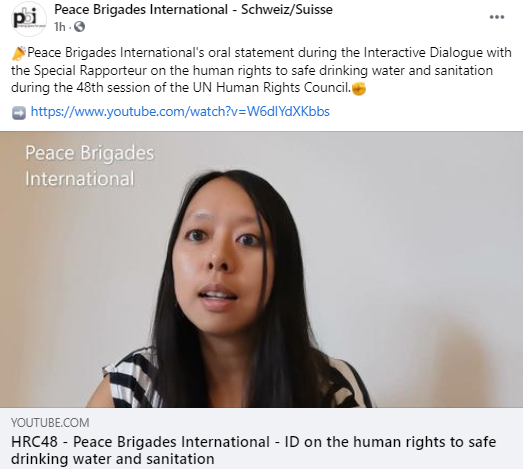
On September 15, Kim-Mai Vu of Peace Brigades International presented to the United Nations Human Rights Council during the Interactive Dialogue with the Special Rapporteur on the human rights to safe drinking water and sanitation.
To watch her presentation in Spanish, please click here. You can also click here and go to the 02:18:39 mark to watch with simultaneous English translation.
Her full intervention is as follows:
“We welcome the Rapporteur’s report that highlights the need to promote the effective participation of civil society in water management, particularly in communities affected by megaprojects. We are alarmed by the 227 murdered water and environmental defenders in 2020 as well as widespread impunity for their attackers.
In Mexico, the Peoples Front in Defense of Land and Water has received attacks for opposing to the PIM, a project that monopolizes large amounts of water from the Cuautla River to the detriment of farming communities. In the absence of indigenous consultation, appeals have been filed, achieving nine suspensions, still pending compliance.
In Putumayo, Magdalena Medio and Norte del Chocó, Colombia, there are threats and persecution against members of ADISPA, Justice and Peace Commission, AguaWil, FEDEPESAN and CREDHOS, who denounce corruption and pollution of rivers and swamps, opposing companies transnationals.
In Retahuleu, Guatemala, the activities of the sugar companies El Pilar, Pantaleón, Magdalena they have altered the course of the rivers. The construction of private mechanical wells causes a shortage of water sources that supply neighboring communities. The people who defend the right to water suffer multiple attacks and intimidation and are often criminalized.
It is urgent that Colombia and Guatemala ratify the Escazú Agreement to increase the guarantees of defenders of the environment.
In Honduras, the approval of two decrees aimed at prioritizing the identification of land, the design, construction and expansion of dams in areas with socio-environmental conflict, mostly indigenous territories and / or protected areas.
In Indonesia, defenders have denounced how megaprojects have reduced access to the water of rural and indigenous communities and caused further environmental degradation.
It is of the utmost importance that the international community urge States to develop policies for safeguarding water in collaboration with defenders as well as implementing policies comprehensive protection for them.”

